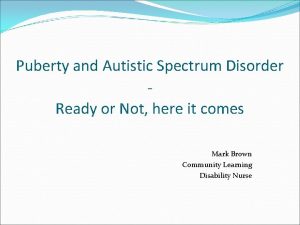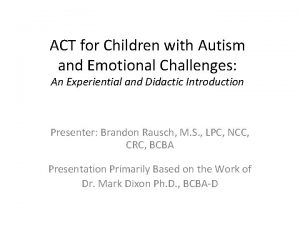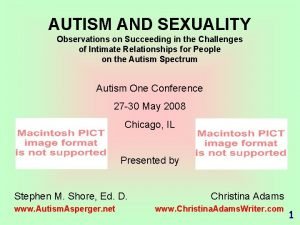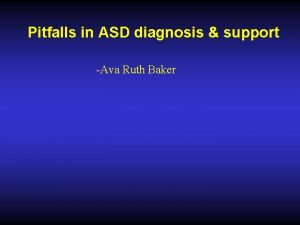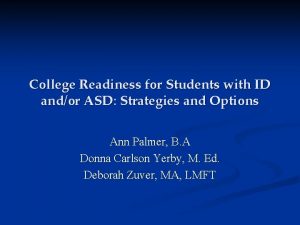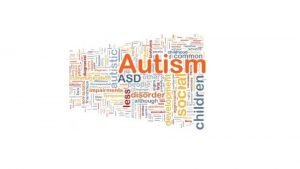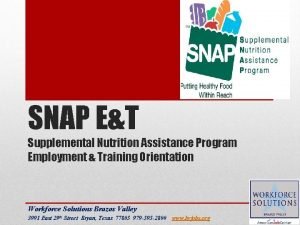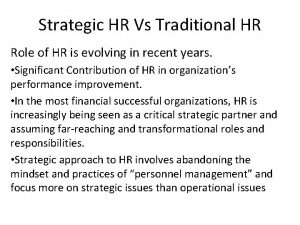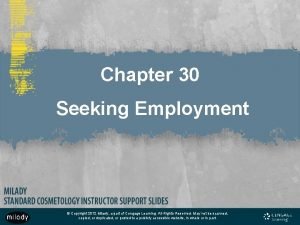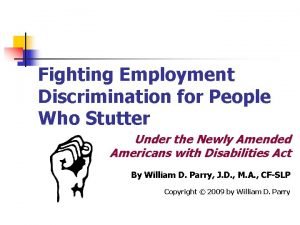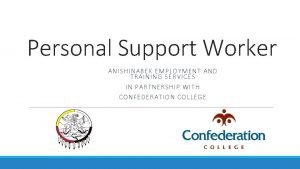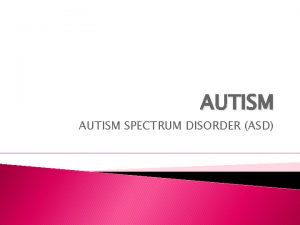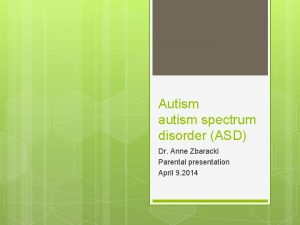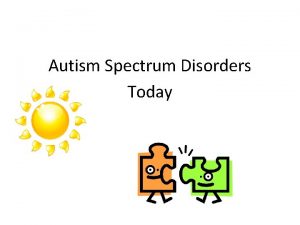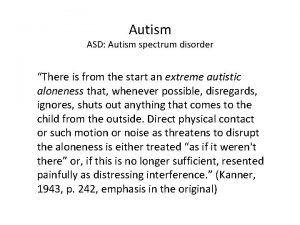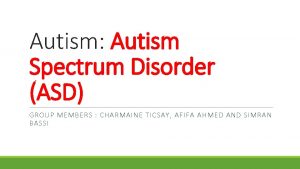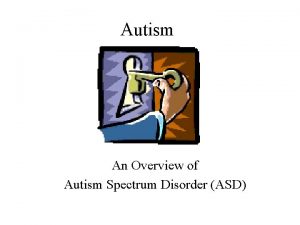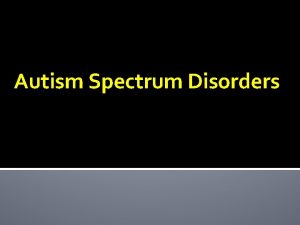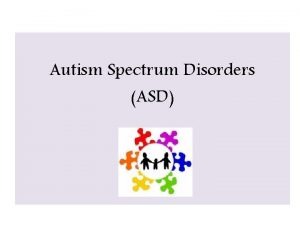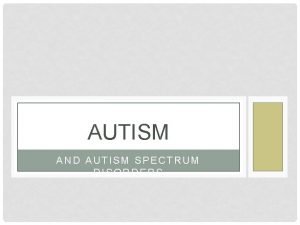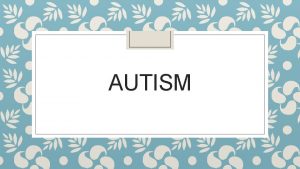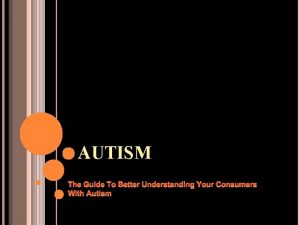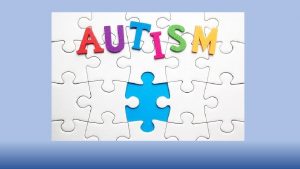Understanding Autism Session 6 ASD and employment ASD














































- Slides: 46

Understanding Autism Session 6: ASD and employment

ASD and employment In this session we will cover: • Work place • Job seekers • Employment support • University and DSA • Disclosing ASD to employers • Reasonable adjustments • Alot of our material has been obtained from the national autistic society, www. Autism. org. uk

Advice about work The NAS has information on its website about: • disclosing your autism diagnosis • handbook covering preparing for work and looking for jobs. • tips for interacting and coping at work • dealing with bullying in the workplace • what the law says about your rights at work.

People with autism have some very valuable skills which can be applied in the workplace. They might have very good attention to detail, or be really good at sticking to routines and timetables. Therefore, are likely to be very punctual and reliable. Everyone has different skills but there will always be something. (NAS Website)

Some employers have applied for an autism friendly kite mark, by demonstrating to the National Autistic Society that their business is autism friendly.



ABOUT THE HANDBOOK. Finding work from the National Autistic Society includes a series of worksheets, information sheets and templates job seekers

The handbook contains nine practical modules: • • • good working practice for professionals understanding autism choosing a suitable role applying for roles interviews finding work experience communication and social skills managing anxiety preparing for the workplace.

https: //www. youtube. com/w atch? v=GQFQ 5 Kqvckc ASD and employment skills

Careers services There are careers services that can offer information and advice on employment and career choices. In England The National Careers Service gives advice on choosing or changing your career, offers skills tests and provides personalised help from careers advisers.

Supported work placements A number of schemes now operate for a short term supported work placement. More are contained on our post diagnostic leaflet: . http: //www. cwp. nhs. uk/resources/leaflets/autismspectrum-disorder-adult-service-post-diagnosisinformation/





• The Work Zone -(Cheshire wide) email: skillsandemployment@cheshirewestandch ester. gov. uk, individualised employment support programme, including support to develop CV, job search and interview.


The NAS offers training courses to any employers about autism, and identifying reasonable adjustments.

Training employers

https: //www. youtube. co m/watch? v=Y_u. N 2 LFv 4 W A Jacks story and employment

Disclosing your autism diagnosis at work It’s often hard to work out the positives and negatives of disclosing at work or when applying for work. You may be wondering about whether your employer and colleagues will understand react to you in a positive way.

The benefits of disclosing: • Under the Autism Act, employers are legally obliged to support you and make reasonable adjustments. • There may be more understanding from your colleagues and manager. • You won’t have to try and hide that you have autism.

The risks of disclosing: • You may experience lack of understanding and adjustments. • You may be worried about prejudice from your employer. • You may be finding it hard to fit in with your colleagues.

Reasonable adjustments • What kind of reasonable adjustments can help an autistic employee? • Under the 2010 Equality Act, employees with a disability are entitled to reasonable adjustments at work to minimise the disadvantageous effects of their disability.

Reasonable Adjustments The types of adjustments that may be put in place for an employee with autism may include: • Making sure the team have some knowledge of autism and how it can affect someone in the workplace. • Making sure instructions are clear, concise, specific and when needed backed up in writing. • Breaking down large tasks into smaller component parts • Having a regular timetable of tasks to give you structure to your working day.

• A buddy or mentor to provide support, reassurance and to discuss specific issues. • Awareness of sensory sensitivity and appropriate adjustments in the work place. • Flexible working hours. Time to adjust to changes • To consider personal requests eg asking that people make it clear if you are talking too long about a particular special interest you may have.

Tips for interacting and coping at work Sometimes it can be helpful for you to have a named person or buddy at work that you can talk to about issues at work. You will be able to discuss any concerns you may have and they will be able to check whether you are confused over instructions that you have been given.

• It does not have to be someone in your team. It is useful to have regular meetings with this person, so that if any incidents do occur you can talk about them as they happen and deal with them promptly, rather than letting things build up over time. • There are often a number of unspoken office rules and it is helpful to go through these with this person. These rules vary greatly between organisations, so it is important to talk them through with someone.

Examples of these rules could be: • offering to make everyone a drink when you make one for yourself. • finding out the arrangements with use of mugs, tea bags/coffee/milk • finding out about what people do at lunchtime.

How to decide whether to disclose your diagnosis: • Draw up a list of positives and negatives. • Ask a friend, relative or adviser to help. • List your strengths and areas you may struggle with. • Identify what reasonable adjustments could be made and discuss these with your employer. • Decide what you do and don’t want your colleagues to know.

Conversations in work You may feel like you want to have a conversation with people at work. Examples of some appropriate topics of conversation could be: • the weather • recent television programmes or films • recent sporting events.

Some inappropriate topics of conversation are: • Money and how much people earn in your team. • Making critical comments about how people look or what they are wearing. • Personal comments about your colleagues.

Bullying in the workplace Bullying is when one person, or a group of people, intentionally cause harm to someone else. They can behave in a way that is deliberately offensive and unkind towards that person.

A person could be bullying: • in the way they talk to you and in their abrupt manner (for example, verbal harassment) • and the things that they subject you to (for example, physical assault). • manipulating you to do things, leaving you out of activities, or talking about you behind your back.

No-one should be bullied at work. Everyone should be treated with dignity and respect. Bullying or harassment should not be tolerated. Your employer is responsible for preventing bullying and harassing behaviour.

What should I do if I'm being bullied? • If you think you are being bullied, try to talk to someone or write down what has been happening. • Share this information with someone you feel you can trust. • More information on bullying in the workplace can be found on the NAS website

University and DSA Universities have to make reasonable adjustments for students with ASD. This also applies to Open University courses. A DSA (Disabled students allowance) can be applied for when applying for student finance. It covers support for things like computers, recording equipment, organizational and assistive software, taxis, and mentors or support workers. This is paid for by the government and not added to the loan.

• Further Education: DSA (disabled student allowance) support in further education, including Open University;



Advocate support: • www. autism. org. uk/advocacyandautism • www. autism. org. uk/directory • Wirral advocacy hub www. wirraladvocacyhub. net • Cheshire advocacy www. cheshireadvocacy. org. uk • Shropshire advocacy https: //www. shropshirepcas. co. uk

Further help from NAS – employment consultancy that empolyers can access: training. enquiries@nas. org. uk

Courses: Online / distance learning courses can be a good way of engaging in education from home. • The open university offers access, foundation and degree level courses • The open College offers college level courses.

Feedback If you have any feedback about this course, or any other information you think we should include, please contact us: Cwp. CRACASDService@nhs. net Or tel 01244 397640 If you would like to be involved with us in shaping services for the future for people with autism, then please contact us with your details

In Summary We hope that you have learnt some information about the work place, your rights, and supported employment schemes, accessing university, disclosing a diagnosis of ASD to employers, reasonable adjustments and advocacy. We hope you have found this information useful.
 Asd vs lrfd
Asd vs lrfd Puberty and autism spectrum disorders
Puberty and autism spectrum disorders Act for children with autism and emotional challenges
Act for children with autism and emotional challenges Autism and chess
Autism and chess Steven 90 day fiancé autistic
Steven 90 day fiancé autistic Glyphosate and autism
Glyphosate and autism Ucla autism center
Ucla autism center Naltrexone and autism
Naltrexone and autism Asd
Asd Pulmonary hangout interval
Pulmonary hangout interval Wide fixed split s2 in asd
Wide fixed split s2 in asd Nmt for asd
Nmt for asd Dr ava ruth baker
Dr ava ruth baker Familienberatung herford
Familienberatung herford Landkreis holzminden jugendamt
Landkreis holzminden jugendamt Software adaptable
Software adaptable Tetralogy of fallot murmur
Tetralogy of fallot murmur Asd college college readiness program
Asd college college readiness program Committee 3000
Committee 3000 Committee 3000
Committee 3000 Aecma simplified english
Aecma simplified english Ostiun
Ostiun Secundum asd
Secundum asd Types of autism spectrum disorder dsm 5
Types of autism spectrum disorder dsm 5 Bmi spectrum
Bmi spectrum Asd crystel b
Asd crystel b Uzvr
Uzvr Asd bmw
Asd bmw Asd
Asd Asd
Asd Asd
Asd Teacher info sheet
Teacher info sheet äsd
äsd Big ass prof
Big ass prof Long run phillips curve
Long run phillips curve What does abawd mean
What does abawd mean Chapter 8 employment labor and wages
Chapter 8 employment labor and wages Classical theory of income and employment
Classical theory of income and employment Difference between strategic hr and traditional hr
Difference between strategic hr and traditional hr When answering a multiple choice question milady
When answering a multiple choice question milady Nzrp quota
Nzrp quota Jobs for people who stutter
Jobs for people who stutter Anishinabek employment and training services
Anishinabek employment and training services Lam employment absence and productivity scale
Lam employment absence and productivity scale Gila river employment and training
Gila river employment and training Chapter 8 employment labor and wages
Chapter 8 employment labor and wages International and comparative employment relations
International and comparative employment relations

